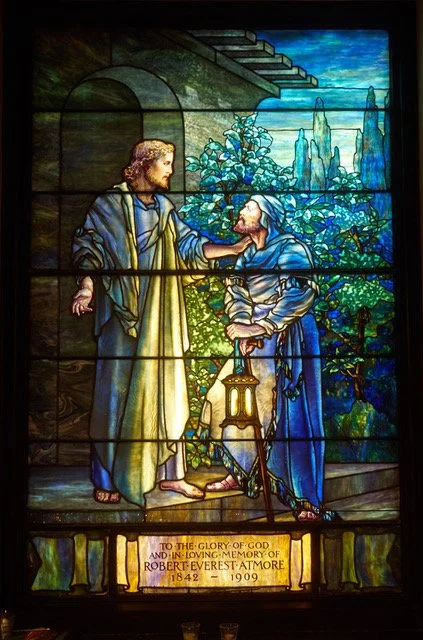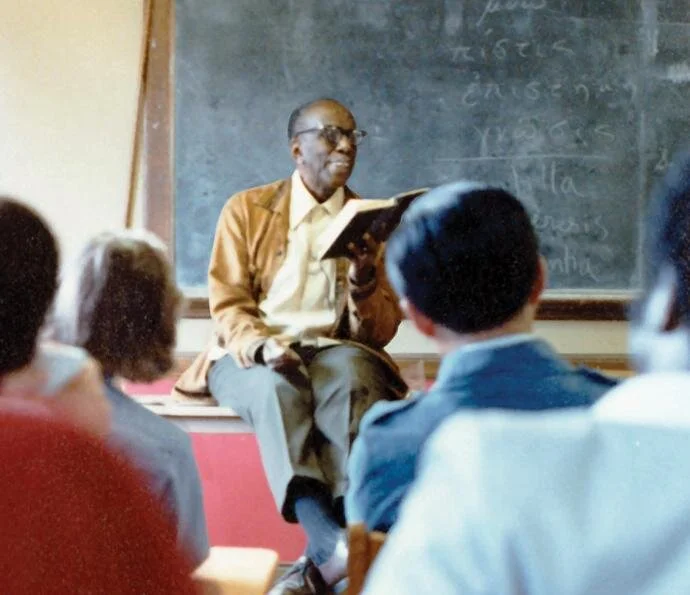Friday Reflection: On Bernard of Clairvaux (1090 – 1153)
Whether [one] may like Saint Bernard or not, whether [one] may understand Saint Bernard or not, [one] can hardly fail to recognize that [we are] face to face with an imposingly important personality. Saint Bernard is too important to be overlooked. He belongs on the bookshelves of every educated person, along with Augustine, Gregory, Anselm and Thomas Aquinas…
—Thomas Merton on Bernard of Clairvaux
View Bernard of Clairvaux’s biography here
I. My favorite Roald Dahl book is The BFG, a morality tale about good and bad and what it means to be a Big Friendly Giant. It is also a story about what human beings do to themselves and to each other. As we spend some time here with Bernard of Clairvaux (celebrated on August 20) we are spending time with a Giant of the Middle Ages, who, when he died, was according to Thomas Merton, “lamented by the whole world of his time” as “one of the dominant figures in the history of the Church, by all odds the greatest of his own century” who had “tremendous influence on the political, literary, and religious life of Europe.” A veritable GIANT: who 800 years after his death, was honored with a Papal Encyclical, Doctor Mellifluus, the author of which, Pope Pius XII, named Bernard “The Last of the Church Fathers.” A Giant who was one of the greatest defenders of the Church and its orthodoxy.
II. As Roald Dahl’s story reveals, there are “good” giants and “bad” giants. In our understanding, mostly in literature, giants tend to be not so good, intense and complicated and they take their lives very seriously, After all, it is not easy being any kind of giant. In Bernard, there was a great deal that was good and a few things that were not so good. He was not perfect by any means, often driven by his need to be right and make things right.
Full Disclosure: Because Bernard of Clairvaux is so BIG as a person and as an historical figure, I have chosen to manage my story carefully and, in doing so, create some boundaries so the reflection is not overwhelmed by too much. Therefore, I have chosen not to address (1) Bernard and the Second Crusade; (2) Bernard and the Jews; (3) Bernard and Peter Abelard (and Heloise); and (4) Bernard and the temptations of the flesh. See paragraph VIII below. Now the story as it is.
III. Bernard was born of aristocratic parents who were committed to living virtuous lives. From a young age, he was intense, complicated and took everything very seriously. His family –five brothers and a sister—was the context in which he learned that faith and morals were foundational, and in which affection, justice and mercy were always modeled. Bernard was a successful school student and studied literature including poetry, to which he seemed to be especially drawn. He developed a keen interest in a literary study of the bible and in the Virgin Mary. It appears that Bernard was committed to his own ecclesiastical advancement, for example, becoming a Canon or even a Bishop, a pursuit that would seem appropriate for a young aristocrat in the early 12th Century. But when he was nineteen (1109), Bernard’s mother died. This was a life changing episode and, not surprisingly, occasioned a reevaluation of his interior life. Bernard realized his own desire for a life of renunciation and solitude, and three years after the death of his mother, Bernard joined the Order of Cistercians (reformed Benedictines), the so-called “White Monks.” This is not, however, to suggest that Bernard knew what it meant to be a monk and how a monastic life ought to be lived. This knowledge would come later as Bernard came to live out his call and very distinctive understanding of the monastic life.
IV. In joining the Cistercians and seeking to leave the world, Bernard entered a life grounded in the presence and power of God. It is not to be overlooked that when Bernard entered the monastery of Citeaux he brought with him thirty or so companions, including his brothers, and assorted relatives and friends. The Cistercian life was severe and demanding but this seems to have been the kind of monastic and personal life Bernard sought. In his early monastic life, Thomas Merton, also a Cistercian (Trappist) wrote a great deal about Bernard. He notes that when Bernard and his companions entered Citeaux, they “saved the life” of this young and still forming monastery. Merton may have been right. After three years of growth for the monastery and three years of study and ordination as a priest, Bernard was sent out by his abbot to found a new monastery, one that would become famous as Clairvaux, “the Valley of Light.” It is at this point that Bernard’s life is forever changed. By virtue of his role as abbot, Bernard had to become something of a public figure who had to attend to the business of the monastery (outside of the monastery) which, perhaps ironically, required a life in the world. And here is where an observation from Thomas Merton is useful:
Bernard, the contemplative, was a great man of action because he was a great contemplative. And because he was a contemplative, he never ceased fearing to be a mere man of action. He knew very well that saints cannot touch pitch without being defiled by it. (Merton in Daniel-Rops, p. 6).
In some respects, then, Bernard seemed to want nothing to do with the world and certainly did not seek to lead a “public life.” Or did he? And here is what is so crucial: grounded as he was in his monastic life as a Cistercian, Bernard’s point of departure was always contemplation and an increasingly rich spiritual life. And as Merton suggests, his life as a contemplative gave him a critical perspective on how he could engage with the world.
V. A complicating element here is Bernard’s tendency to keep going with his monastic life, as well as with his leadership as abbot, including the need to travel to establish new monasteries, to preach, to teach and write, all to the point of exhaustion and often, stress related illnesses, e.g. migraines, gastritis and hypertension. Often in the early years at Clairvaux, Bernard would not or could not eat because of the poverty of the monastery; most always he exceeded reasonable practices of austerity. For a period, because of his various illnesses, Bernard was forced to quarantine and live in a hut apart from the community, a hut used as the monastery infirmary. It is not reckless to suggest that Bernard’s life was often sacrificed to exhaustion. And yet, while he was in the infirmary/hut, Bernard studied and wrote, living as a hermit. In thinking about Bernard, we are forever aware of a tension between his monastic life (contemplation) and his life in the world (action); between a desire to serve God in the monastery and a commitment to God’s Church, all in obedience, charity, and holiness.
VI. When Bernard was consecrated as the Abbot of Clairvaux, he was twenty-five years old. This is the moment when Bernard began his public life, the life of a “man of action,” a man who moves more frequently into the world and out of his monastery. We have seen how Bernard becoming a public figure had everything to do with his role as abbot of Clairvaux and the fact that his monastery was outgrowing itself because so many men joined. As abbot, Bernard’s responsibility was to care for and minster to his monks, and to see that the practical needs of the monastery were both met and managed. But because more and more men wished to join Clairvaux, Bernard was required to look outward and to found new Cistercian monasteries, a task that required a great deal of attention, for example., meeting and working with Canons and Bishops and local leaders of the villages and towns in the area of the proposed new monastery. And, for the most part, Bernard was the “institutional advancement” person for both Clairvaux and, eventually, the Cistercian order. While Bernard would choose monks from Clairvaux to found a new monastery, he had to make sure everything was in order so that when the monks arrived they could begin building and planting and organizing. And, of course, there were always the financial needs. All this was administrative and supervisory work and for many years, this work was done primarily by Bernard, the man of action, whose “job” it was to make everything “work.”
VII. We are beginning to outline some of what it might mean to be a “giant” and how a “giant” might go about doing the “work” that needed to be done. In the case of Bernard of Clairvaux being a “giant” meant having enormous influence in monasticism, in the Church, and in the world, in that order. What’s more, the three “parts” are connected,and each part informs and shapes the other parts, all for the sake of doing good work. In Bernard’s case, his full, rich, and exhausting life was mostly, but not always, integrated. However integrated Bernard’s life was, over the course of this life, as counselor and mediator for different figures and different institutions in warring and political conflict, he was often burdened with and exhausted by finding solutions. This took a toll because the very “bigness” for which he was honored as a Doctor of the Church, often wreaked havoc with his contemplative life in the monastery, something he seemed to have wanted more than anything else.
VIII. In writing this reflection, I’ve come to realize that I have been trying to tell the WHOLE story of Bernard of Clairvaux and late this morning (Thursday, August 27), I decided enough is enough. First of all, the biography in A Great Cloud of Witnesses is very well done: concise but comprehensive and an excellent introduction to Bernard. Secondly, the goal of these Friday Reflections is to allow you--the readers—to be able to engage with each subject enough to see in him/her at least some of what we see—or wish to see-in ourselves, and a long and sometimes boring discussion of all the things that Bernard accomplished in his life as a Giant, is not going to do much for anyone. Surely, there are connections to be made but, after all, many of Bernard’s 900 year-old achievements will have little meaning for us in this time, our time, nine hundred years later. Consider, for example, leading a Crusade; helping heal the great schism of the antipopes; founding over 70 Cistercians monasteries; being the confidant of five Popes; serving as counselor and mediator for a number of civil and ecclesiastical councils; deposing the great Peter Abelard in a public session; helping heal the conflict between the “Black Monks” (Benedictines) and the “White Monks” (Cistercians); being a friend to royalty, politicians, and monastic leaders. There is not a great deal to emulate here. But these Friday Reflections are meant to connect us to who a person is and how this person led his/her life, and not so much about what our Holy Person did.
IX. So who, then, is our “Big Friendly Giant,” Bernard of Clairvaux, the last of the Church Fathers and what can we learn about him and how he led his life? Several things, I believe. We can learn to be comfortable living with both contemplative prayer and the active life. In doing so, we can live in the presence of God in all that we do. We can learn what it means to be holy. We can remember that justice and mercy are not the same thing. We can be driven and fierce and even ambitious, as long as we temper each with love and humility. We can work ourselves to exhaustion but only in the service of others. We can always practice kindness, though it is harder to practice humility. We can remember that many of us are wounded and broken and seek healing. We can and should be—if we can—deeply caring and knowing teachers. We can learn to manage fame as we can learn to accept death. With our intelligence, we can learn to learn. We can learn that theology, as long as we are open to it, can encounter and nourish at the same time. We can learn to live with the rules we believe in, even if it means that in our Faith we decide to live with some orthodoxy. We can learn that if we practice fidelity, we can ”be filled with the spirit of understanding.” (Sirach 39: 6) We can learn when and how to be people of action. We can learn to be students, just as we can learn to be pastoral. And, as long as we listen deeply, we can learn how to navigate the will of God. All this, and more, we can learn from Bernard of Clairvaux.
X. Finally—at last!—one important way to truly know Bernard and learn from him is to read his letters, of which there are hundreds. Here is an excerpt from a letter to the Benedictine abbot, William of Thierry, who had written to Bernard seeking to become a Cistercian:
If I am to say what I think (about your plan), I must tell you that, unless I am mistaken, it is something I could not advise you to attempt and that you could not carry out. Indeed, I wish for you what it has for long been no secret to me that you wish for yourself. But putting aside what both of us wish, as it is right we should, it is safer for me and more advantageous for you if I advise you as I think God wishes. Therefore, I say hold on to what you have, remain where you are, and try to benefit those over whom you rule. Do not try to escape the responsibility of office while you are still able to discharge it for the benefit of your subjects. Woe to you if you rule them and do not benefit them because you shirk the burden of ruling them.
—The Letters of Saint Bernard of Clairvaux, translated by Bruno Scott James, p.128.
Yes, it is all here, and with only one “should.”
Oh God, by whose grace your servant Bernard of Clairvaux, kindled with the flame of your love, became a burning and shining light in your Church: Grant that we may also be aflame with the spirit of love and discipline and walk before you as children of light; through Jesus Christ our Lord, who lives and reigns with you and the Holy Spirit, one God, now and for ever.
AMEN
—Peter Kountz










